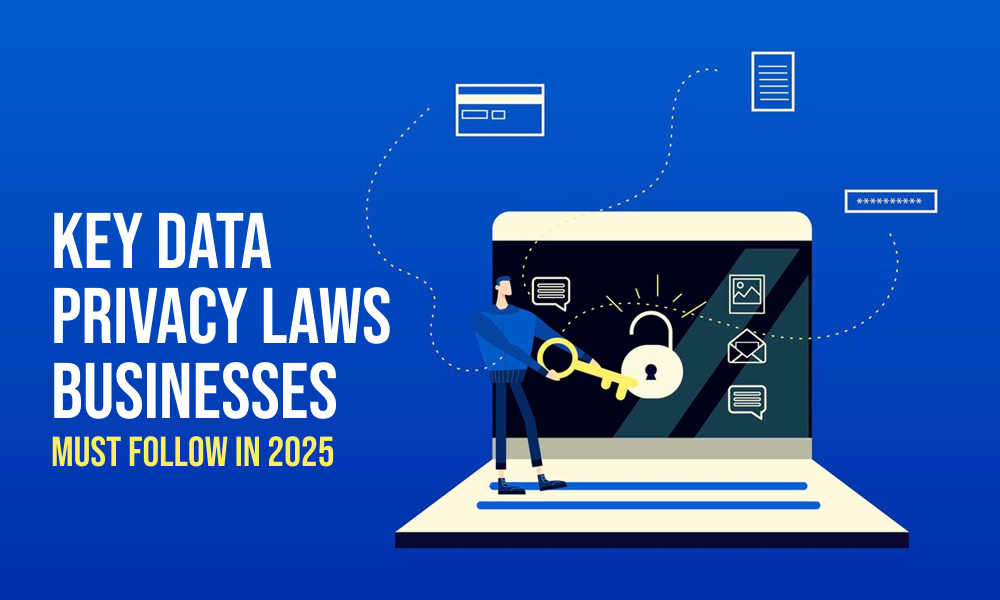table of content
- Introduction
- What is Data Privacy Compliance? Why is it important for Business?
- Benefits of Data Privacy Compliance
- What are the Risks of Ignoring Legal Compliance in Software Development?
- The Evolution of Data Privacy Laws: Past to Present
- What are the Key Data Privacy Regulations Businesses Must Follow?
- Digital Personal Data Protection Act (DPDPA) – India
- General Data Protection Regulation (GDPR) – EU
- Health Insurance Portability and Accountability Act (HIPAA) – US
- ISO 27001 – Global
- Payment Card Industry Data Security Standard (PCI DSS)
- Federal Risk and Authorization Management Program (FedRAMP) – US
- SOC 2 Type 2 – Global
- Federal Information Security Management Act (FISMA) – US
- The Future of Data Privacy Laws: What’s Next?
- Conclusion
- FAQs
What Are the Key Data Privacy Laws Businesses Must Follow in 2025?

Introduction
Data privacy rules are continually expanding, and failing to comply can result in significant financial penalties, lawsuits, and a loss of customer trust. Are you prepared? Laws like the GDPR and India’s DPDPA 2023 require strict data handling procedures. Ignoring them might result in reputational harm and security breaches. This guide helps you easily navigate compliance by breaking down important laws, risks of ignoring compliance, and emerging trends to keep the data compliant. Let’s Explore!
What is Data Privacy Compliance? Why is it important for Business?
Data privacy compliance involves establishing policies and practices that fit with legal requirements regarding the protection of user data. It brings together a business’s desire to collect data and a person’s right to control their data. Compliance is related to legal obligations, but it is also about building user trust, promoting ethical practices, and strengthening consumer relationships. Businesses create trust in the long run by prioritizing data security and ensuring trust in a digital world, where developing a legitimate and defined data management strategy is needed to stay competitive and remain compliant.
Benefits of Data Privacy Compliance:
- Legal Protection & Avoiding Penalties: Staying compliant with laws like GDPR and CCPA is crucial. It helps you dodge those hefty fines, lawsuits, and legal troubles that can drain your finances and limit your business operations.
- Building Customer Trust & Brand Reputation: Safeguarding user data boosts your credibility and customer loyalty. It also shields you from the reputational harm that can come from data breaches, paving the way for long-term success in your business.
- Enhancing Security & Preventing Cyber Threats: Compliance means implementing robust cybersecurity measures, which significantly lowers the chances of data breaches, hacking attempts, and identity theft. This way, you’re keeping both your sensitive business information and your customers’ data safe.
- Ensuring Market Access & Business Expansion: Many industries require compliance certifications to operate in global markets, attract enterprise clients, and meet regulatory demands for partnerships.
- Mitigating Operational Disruptions & Financial Losses: Regulation violations may lead to audits, investigations, and litigation, which may cause operations to lag, legal expenses to increase, and investor confidence to decline.
- Gaining a Competitive Advantage: In an increasingly data-conscious digital environment, software development companies that put a high priority on compliance stand out as reliable service providers, drawing clients, partners, and investors.
What are the Risks of Ignoring Legal Compliance in Software Development?
- Severe Legal Penalties: Non-compliance with data protection laws can result in hefty fines, lawsuits, and even criminal charges, severely impacting a company’s financial stability and operations.
- Cyberattacks and Data Breaches: Ignoring security measures leaves software vulnerable to hackers, leading to unauthorized access, data theft, and loss of sensitive customer and business information.
- Reputation and Customer Trust Loss: A single security breach can erode customer confidence, driving users away from competitors and damaging the company’s brand image beyond repair.
- Financial and Operational Disruptions: Recovering from security breaches involves legal costs, compensation claims, and operational downtime, significantly affecting business growth and profitability.
- Business Closure and License Revocation: Failure to comply with industry regulations can lead to revoked licenses, restricted market access, and, in extreme cases, permanent business shutdown.
The Evolution of Data Privacy Laws: Past to Present
India’s stance on data privacy has changed dramatically over the years. In the beginning, data privacy was only loosely governed by the Information Technology (IT) Act, 2000, which was more about cybersecurity than about the protection of personal data. The 2008 amendment imposed stronger provisions that included:
- Section 43A – Held companies liable for negligence in protecting sensitive data.
- Section 72A – Penalized unauthorized disclosure of personal information.
Yet these laws did not specify clear directions regarding user consent, processing limits on data, and enforcement provisions. As companies became increasingly dependent on user information, privacy issues multiplied and resulted in several data breaches. The lack of a separate data protection regime compromised assurance and consumer confidence.
The Turning Point: Supreme Court Ruling & DPDPA 2023
An important turning point was the 2017 Supreme Court decision (Justice K.S. Puttaswamy case), which acknowledged privacy as a fundamental right. As a result, the Digital Personal Data Protection Act (DPDPA), 2023, was introduced which also serves as the foundation for a stronger legal framework.
Key advancements in DPDPA 2023:
- Stronger Data Rights – Individuals can access, modify, or request the deletion of their data.
- Explicit Consent Requirements – Businesses must obtain clear user consent before collecting data.
- Data Protection Authority (DPA) – An independent regulatory body to oversee compliance and enforce penalties.
- Mandatory Data Breach Reporting – Organizations must report data breaches promptly.
Challenges and Loopholes: Despite its advancements, the DPDPA still faces key challenges:
- Broad Government Oversight – This Act gives the government extensive powers, which raises some concerns about its misuse.
- Compliance Costs – Small and medium enterprises (SMEs) could find it tough to put in place the strict data protection measures required.
- Low Consumer Awareness – A lot of people still don’t know their rights when it comes to data privacy, which really limits the effectiveness of the law.
The DPDPA, 2023 is a big move in the right direction for India’s data privacy, but companies still need to be attentive in making sure they’re in compliance. Furthermore, ongoing enhancements and consumer education initiatives will be essential to ensuring that India’s data privacy legislation is effective.
What are the Key Data Privacy Regulations Businesses Must Follow?
Digital Personal Data Protection Act (DPDPA) – India
The Digital Personal Data Protection Act (DPDPA), which became law in 2023, is a major development for data protection in India. It governs how personal information is collected, used, and stored with a strong emphasis on clarity, responsibility, and security. Here are the main aspects:
- User Consent: Businesses must obtain proper permission from individuals before collecting or using their data.
- Rights of Data Principals: Individuals have the right to look at, correct, and delete their personal information. They can also file complaints if they have issues.
- Data Protection Authority (DPA): This authority is established to ensure that everyone is following the rules. It also helps resolve disputes and can impose penalties on those who violate the law.
- International Applicability: The act also covers companies based outside of India if they deal with data belonging to Indian citizens. This is crucial for companies operating on a global scale.
Overall, the DPDPA ensures that businesses adhere to effective data protection practices. It aims to protect individual privacy and foster trust in the rapidly growing digital economy of India.
General Data Protection Regulation (GDPR) – EU
The General Data Protection Regulation (GDPR), implemented in 2018 by the European Union, is one of the most stringent data privacy laws globally. It applies to any business that collects or processes data of EU citizens, regardless of the business’s location. Key provisions include:
- User Consent: Businesses must obtain unambiguous consent from users before processing personal data.
- Rights of Individuals: GDPR provides individuals with the right to access, rectify, erase, and transfer their data. It also grants the right to object to data processing.
- Penalties: Non-compliance can result in fines of up to 4% of a company’s global revenue or €20 million, whichever is higher.
For Indian businesses working with EU customers, GDPR compliance is essential to avoid penalties and safeguard consumer trust.
Health Insurance Portability and Accountability Act (HIPAA) – US
HIPAA is a U.S. law that governs the privacy and security of health information, specifically in the healthcare industry. For Indian healthcare businesses or any company dealing with U.S. patient data, HIPAA compliance is essential. Key provisions include:
- Privacy Rule: Protects patient information and limits its use to what is necessary for treatment, payment, and healthcare operations.
- Security Rule: Requires healthcare organizations to implement technical safeguards, including encryption, to secure electronic health records (EHR).
- Breach Notification Rule: In case of a data breach, companies must notify affected individuals and relevant authorities within specific time frames.
HIPAA compliance is crucial for healthcare providers, insurers, and business associates in India working with U.S. healthcare organizations to maintain the confidentiality of sensitive health information.
ISO 27001 – Global
ISO/IEC 27001 is an international standard for Information Security Management Systems (ISMS), which gives a systematic way to protect sensitive information. It emphasizes risk analysis, business continuity, and audit compliance to provide data confidentiality, integrity, and availability.
This certification is crucial for companies, particularly IT and finance, that deal with sensitive data and wish to gain the trust of customers and stakeholders. Periodic audits ensure continued compliance, so ISO 27001 is necessary for organizations dedicated to strong data security and regulatory compliance.
Payment Card Industry Data Security Standard (PCI DSS)

PCI DSS targets enterprises that process, store, and transmit credit card information of users with the purpose of preventing security breaches and card fraud. Notable requirements among them are data encryption both on transmission and on storage, limitations on access only to qualified employees, and daily monitoring and system testing of network security issues.
Compliance with PCI DSS is necessary for e-commerce, financial service, or any credit card handling industry businesses. Adherence to these standards contributes to building trust and helps to avoid possible financial loss due to security breaches.
Federal Risk and Authorization Management Program (FedRAMP) – US
FedRAMP is a U.S. government initiative that establishes security requirements for cloud service providers (CSPs) that serve federal agencies. CSPs are required to undergo security reviews, adhere to stringent security baselines, and regularly scan their systems for possible vulnerabilities.
Audits on a regular basis ensure compliance with FedRAMP standards. Indian businesses offering cloud services to U.S. federal institutions must comply with these standards to provide data security and uphold business relationships with federal institutions to ensure trust and consistency with U.S. government regulations.
SOC 2 Type 2 – Global
SOC 2 Type 2 is an accounting standard utilized by technology firms to evaluate the security, availability, processing integrity, confidentiality, and privacy of their systems. It was created by AICPA and emphasizes the effectiveness of controls over a given time frame.
The key areas involve robust security controls to safeguard customer information, maintaining privacy and confidentiality, and showing operational effectiveness. SOC 2 Type 2 certification is crucial for SaaS and cloud organizations, giving assurances to customers that their confidential information is handled securely and responsibly.
Federal Information Security Management Act (FISMA) – US
The Federal Information Security Management Act (FISMA) mandates U.S. federal agencies and their contractors to put in place strong security controls to safeguard sensitive information. The main provisions involve formulating detailed security plans, employing sophisticated software, and ongoing monitoring and evaluating security procedures.
Indian companies contracted by U.S. federal agencies must abide by FISMA to protect federal data to meet stringent security standards and reduce vulnerabilities. FISMA compliance is required for the purpose of retaining government contracts and data protection.
These data privacy laws make sure that companies all over the world, including Indian businesses, safeguard sensitive information, uphold customer confidence, and abide by international standards. Adherence not only helps lessen the risk of monetary fines but also improves brand image and business security.
The Future of Data Privacy Laws: What’s Next?
As technology continues to develop, compliance with data privacy will be stricter, and companies will need to remain proactive in protecting user data. Regulatory policies will keep evolving to tackle emerging issues in AI, cross-border data flows, and consumer protection.
Key Regulatory Focus Areas
- AI and Machine Learning: New laws will ensure the ethical use of AI, preventing biased algorithms, unauthorized data exploitation, and excessive data collection that may infringe on individual privacy rights.
- Cross-Border Data Transfers: Governments will establish stricter regulations to ensure that personal data transferred across borders complies with local privacy laws and is protected from unauthorized access.
- Enhanced Consumer Rights: Future regulations may introduce stronger rights for consumers, such as clearer data access, improved portability options, and greater transparency in automated decision-making processes.
Global Privacy Trends
- Regulatory Convergence: The adoption of GDPR-like laws such as the CCPA in the U.S., LGPD in Brazil, and DPDPA in India across countries worldwide aims to establish unified privacy standards while tackling local privacy matters.
- Robust Enforcement: The escalation of fines and penalties by regulatory authorities for non-compliance makes it necessary for businesses to establish strong data protection frameworks to mitigate legal and financial threats.
- Consumer Advocacy: As awareness of data privacy issues grows among consumers, they demand stronger regulatory measures and hold businesses responsible for their personal data handling practices.
Future Predictions
Privacy by Design: Businesses prioritize privacy protection during the initial stages of product and service design. Instead of correcting problems later, they start their processes with privacy protection to meet legal requirements.
- Decentralized Data Models: As blockchain technology advances we may see a shift towards decentralized data storage methods. This approach reduces central storage vulnerabilities and empowers individuals to maintain better control of their personal information.
- Advanced Encryption: Businesses can enhance their security protocols to protect sensitive data during storage and sharing procedures. To defend against modern cyber threats businesses are adopting more complex encryption methods that withstand quantum computer capabilities.
- Privacy Compliance Tools: To ensure compliance with privacy regulations such as GDPR, CCPA, and the DPDP Act businesses will need to use automated consent management tools along with data masking systems and secure storage solutions.
When companies adopt these changes, they prepare their data privacy strategies for future challenges and build consumer confidence while maintaining continuous regulatory conformity.
Conclusion
Data privacy compliance is now required for legal protection, customer trust, and business success; it is no longer an option. Being innovative guarantees long-term success in the face of ever-tougher regulations. Your business can avoid penalties and achieve a competitive edge with strong data protection.
CodeStore offers safe, scalable, and legally compliant solutions if you require custom software development that complies with strict compliance requirements. Lead the way in the evolving digital world, avoid legal risks, and cultivate trust. Collaborate with CodeStore to get future-proof, compliant software that meets your company’s needs!
FAQs
What is data privacy compliance?
Data privacy compliance ensures businesses follow legal standards like GDPR and DPDPA 2023 to protect user data, prevent breaches, and build customer trust while avoiding legal penalties.
Why is data privacy compliance important for businesses?
Compliance prevents legal fines, enhances brand trust, improves security, ensures global market access, and protects businesses from cyber threats, financial losses, and operational disruptions.
What are the key data privacy laws businesses must follow?
Major laws include GDPR (EU), DPDPA (India), CCPA (US), HIPAA (US healthcare), ISO 27001, PCI DSS (financial data), and SOC 2 for secure data handling.
What are the penalties for non-compliance with data privacy laws?
Businesses face heavy fines, lawsuits, reputational damage, loss of market access, and in severe cases, operational shutdowns due to data breaches and regulatory violations.
How can businesses ensure compliance with data privacy laws?
Companies must implement strong security measures, obtain user consent, conduct regular audits, use encryption, train employees, and follow industry-specific regulations.
What industries require strict data privacy compliance?
Healthcare, finance, e-commerce, cloud services, and software development industries must comply with strict data protection laws to safeguard sensitive customer and business information.
How does GDPR affect businesses outside the EU?
GDPR applies to any business handling EU citizens’ data, requiring strict compliance with consent rules, data security, and breach reporting to avoid heavy penalties.
Why choose CodeStore for compliant software development?
CodeStore delivers secure, scalable, and legally compliant custom software solutions to businesses that meet global data privacy regulations while enhancing trust and operational efficiency.
[number]




